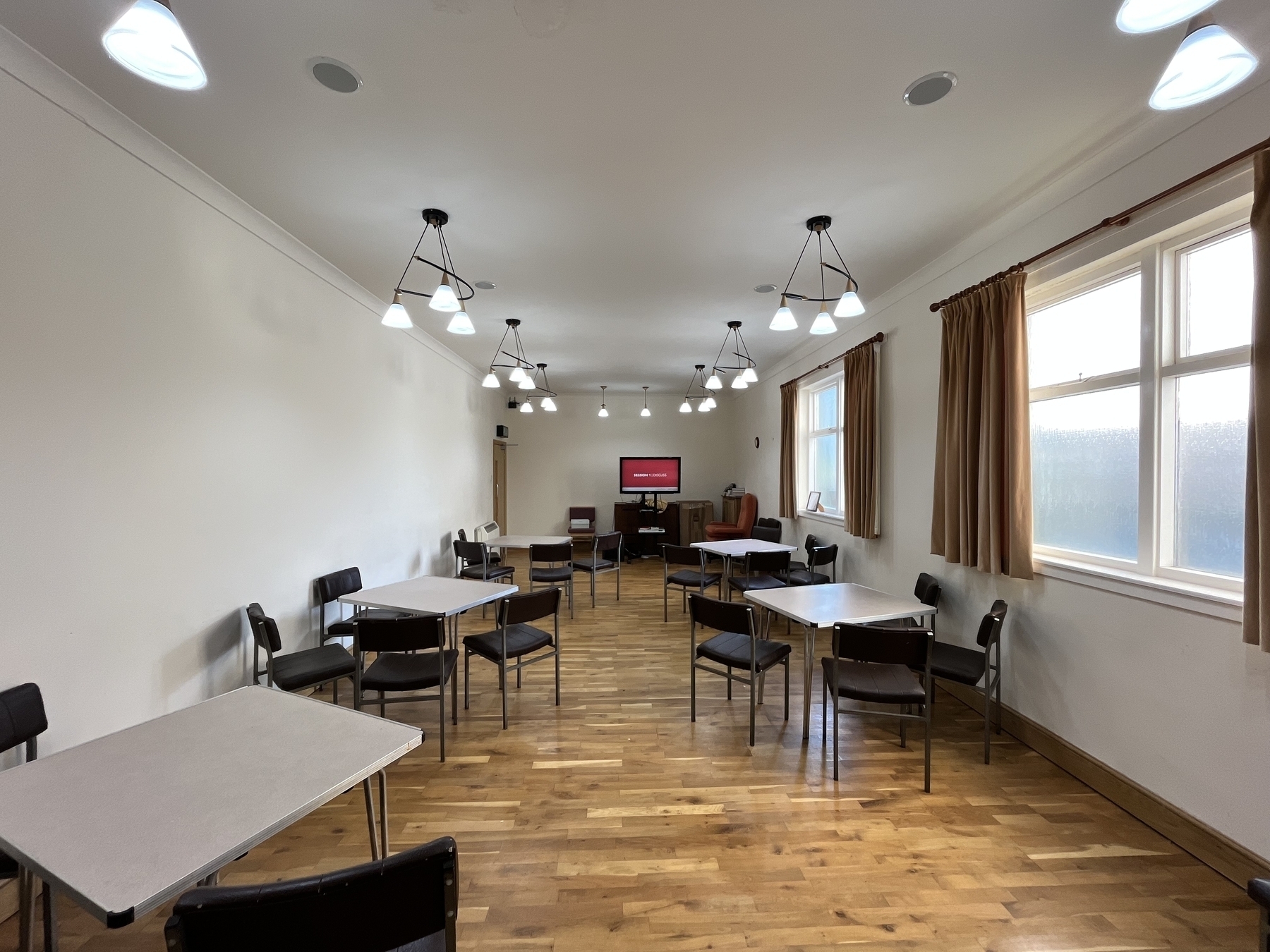I am not a fast runner by any metric but it feels good to finally start getting some proper distance in each week. 🏃🏃♀️🏃♂️

One of the cool things about running Christianity Explored is hearing the questions people want answered. Some questions seem simple on the surface but actually get to why there were multiple councils in the 4th and 5th centuries. Understanding Jesus is really hard.
Can confirm, after movie night with the kids, that Back To The Future holds up. 🍿 🎥
Christianity Explored starts today at Ardgowan Square. Both nervous and excited to see how it goes.

Just back from our weekly prayer meeting. Normally we look at a question from the New City Catechism but we are starting Christianity Explored this week so we’re focusing our prayer meetings on that for a few weeks. Such an encouraging time praying with God’s people.
reflections on the residential week

Last week was spent at a Scripture Union activity centre thinking really big thoughts about God with a group of around 20 pastors, women’s workers, and ministers-in-training.
Here are just a few of the things I took away from the week.
The Creator/creature distinction cannot be overemphasised
I mentioned, as I traveled to the residential, that we were going to be spending this term studying the doctrine of God. That is, theology proper. Theology means god words after all. And when we consider God in his being, we very quickly reach the limits of our own finite minds.
Because we can only conceive of things in a creaturely way, we struggle to remember that, actually, we aren’t God and cannot know him as he knows himself (see this article for an accessible answer as to why).
When we forget this we make one of two errors:
- Either God is shrunk down to our level
- or we raise ourselves up to his level
It’s from this vantage point that we see how heresies regarding the Trinity are able to be conceived. The god of the JWs or the LDS or of Islam is comprehensible to the human mind which is why their conception of God simply doesn’t work. A god who fits within the framework of a created mind is a god who is too small.
So we have to keep reminding ourselves that we are trying to think true thoughts in a creaturely way. It is possible, but we are inherently limited.
The works of the Son are the works of the Father
Something that was pointed out by Andy Gemmill is that it is really easy to find ourselves looking at extra-biblical material as we do the work of studying theology. There is technical language (of necessity because, again, we’re trying to work out how to say what is not straightforward to say). There are many, many, many, many… books about theology written by people with very big brains.
To guard against this, alongside the books we’ll be studying, we are also working through John’s gospel. People really like John’s gospel because of the way it portrays Jesus and gives us the answer to the question of why it was written. What I never realised before, after many readings, was just how crucial it is for giving us our doctrine of God. Were it not for John’s gospel, our theologies would be deeply lacking.
And one of the big lessons there is that the works of Jesus, the incarnate Son, are so closely linked with those of the Father that to see one is to see the other (John 5:17). This is why John tells his audience that Jesus has made him known (John 1:18).
Christian friendship in ministry is really good

While we spent a good amount of time studying together, the other purpose of the residential is for us to just spend time together. Ministry can be quite lonely, especially if there are not many faithful churches nearby. And so these residential are a good opportunity to hangout and enjoy time with ministry workers who are in other contexts. Some of us are from post-industrial, working class towns, some from city centres, some from more rural settings. But these weeks, and our times in the classroom throughout the year, are such a great help.
It’s looking like it will be an intense year. This term is the doctrine of God and the next one is Christology. Both things which force you to think carefully and in a way that is very stretching. I’m just glad I’m using Obsidian to keep track of my notes for this.
It’s been over a year since I did any serious run training but it was good to start a new training plan today to bring down my 5k time. Running was a great way to explore Warsaw a few years ago and I already saw parts of town that I’ve not really been around today.
Climbed up Loudoun Hill for the first time.

My training course starts a new term today which means the annual residential intensive. We’re studying the doctrine of God for this module and the reading is going to be pretty intense and technical.

Started reading: Crying in H Mart by Michelle Zauner 📚
Really excited to finally have a source for East Asian food in Greenock. 🍜


Finished reading: The Trinity by Scott Swain 📚
Today marks five years since we left America to start doing gospel ministry in the UK. There have been many ups and downs(and a year in Poland) since then, but I can’t imagine doing anything else.
some observations on being a disciple
I’m preaching through a bit of a topical series at the moment, where the topics are from the Great Commission in Matthew 28:18-20. My normal mode of teaching is expository, but this is proving to be a good exercise as well. It’s helpful for us to see how things in Scripture join up, and everything is joined up.
My main anchor text for this week is the closing section of Jesus’ prayer in John 17:20-26. It’s a slightly odd place to go when thinking about discipleship, but there is definitely that line of thinking within it.
As Jesus prays, he knows that the cross is coming and he knows that his disciples are going to need help. And so within earshot of them, he prays to his Father and talks about all that he has done. He praises his Father, perfectly. He says he has given his disciples the Father’s word. He asks the Father to set them apart in the truth, which is his word.
And then he speaks of those who will come to faith later.
“I do not ask for these only, but also for those who will believe in me through their word, that they may all be one, just as you, Father, are in me, and I in you, that they also may be in us, so that the world may believe that you have sent me. The glory that you have given me I have given to them, that they may be one even as we are one, I in them and you in me, that they may become perfectly one, so that the world may know that you sent me and loved them even as you loved me. Father, I desire that they also, whom you have given me, may be with me where I am, to see my glory that you have given me because you loved me before the foundation of the world. O righteous Father, even though the world does not know you, I know you, and these know that you have sent me. I made known to them your name, and I will continue to make it known, that the love with which you have loved me may be in them, and I in them.” (John 17:20-26 ESV)
There is much more to be said about this, but some of what I can see as I work through this and prepare to preach on Sunday is:
Disciples believe through the testimony of other disciples
While it’s tempting to believe that we just need to live a good, moral life to be a sharing the gospel, its clear from Scripture that using words to communicate the gospel is the way that people come to believe.
Disciples are united together in Christ
I’ve heard people say that you don’t need to go to church to be a good Christian. Or that the church should really be about social action or something else. In reality, the reason why the church exists is because it is a gathered group of people who have been united to and in Christ. He is the reason why the church gathers. He is the reason why this odd mix of people from different backgrounds, classes, races, political persuasions can coexist in the very same community. Jesus breaks down all of those barriers and joins people together in him.
Disciples are united together to be a witness
Us being together and united in Christ shows the world that Jesus is sent by the Father. He says so right there in his prayer. They reason why Jesus wants Christians to be united together is because it is how the world knows that we are loved by God. Jesus was sent because God loved the world, and Christians united around that fact is the testimony to that being true. The proof of who Jesus is and what he did is in the miracle of Christian community.
Disciples want to take the message to the world
At a conference this summer, Richard Pratt explained that the mission the disciples had was to take the whole world for Jesus. Jesus explicitly tells the disciples to go and make disciples of all nations. This wasn’t some isolated mission only meant for 1st century Palestine. It started there, but it won’t end there. Because God’s people have taken this message and mission seriously, there are more Christians around the world in more places than there have ever been at any point in history. For example. In 1 AD, the world population was about 300 million people. Today, there are between 80 and 100 million Christians in China alone.
While the mission is far from over and the work is far from complete, there is much reason to be encouraged and much reason to continue to persevere in telling people about Jesus.
At my own church, we are preparing to run Christianity Explored next month. If you’re reading this and are a Christian, please pray for us. Pray that we would be asking people to come, pray that they would actually come, and pray that we would trust God to be at work in the hearts of those who do come. Pray that we would be encouraged to share the gospel and that we would be brave.
We went for a day trip to Edinburgh last week to see old friends and for one last hurrah before the kids go back to school.📷

publicly christian
As I write this, I’m in a trendy food hall in a town that was not trendy when I left. Gentrification has taken hold of this place and now you’re more likely to see semi-ironic mullets and limited-edition Jordans than the needles and detritus that would have once been ubiquitous.
What hasn’t changed is the fact that actual, practicing Christians seem to still be around. In public. Something I once took for granted, that you would see Christians in a coffee shop, Bibles open and conversation happening, is now novel. It isn’t novel here. This is the dream sold to a certain demographic by the likes of memoirist-turned-business-guru Donald Miller.
But it’s novel to me because I now live and work in a place where the religion consists primarily of heroine, sports gambling, Buckfast and Pride.
During my apprenticeship, we spent a day working through 1 Peter and one of the big takeaways, one of the big reminders that was needed from it was the pressure that is on the average Christian to be so in a public way. Lisa Cameron, my MP before moving to Greenock, received death threats.
I shared with family the situation regarding religion in the UK and Scotland in particular and was met with actual shock and horror. This is understandable. In the American southwest, there are churches everywhere. It’s really easy to find a place where you will fit in. If one place doesn’t work out, try the place next door. Consumer-focussed Christianity makes for a lot of choice.
This worldview, that Christians are experiencing actual peril and threat, is surprising to us but it shouldn’t be. Five of the countries represented in the Women’s World Cup are on the Open Doors World Watch list. These countries are on the public stage and one of the things they are known for is killing Christians.
Even that may be shocking to us in the West, but it shouldn’t be because it has always been this way. Where’s the proof?
- Mark 8:34-38
- Mark 10:29-31
- Mark 12:7-8
- Mark 13:9-13
- John 15:18-25
- John 16:2-3
- Acts 5:17-18
- Acts 7:54-60
- Acts 8:3
- Acts 12:1-5
You get the picture. From it’s earliest days, the Church has been met with more than opposition but with actually being hunted down.
The shift toward persecution is already beginning in Scotland, as mentioned before. I do wonder what the American church response will be when the zeitgeist is louder than them. It is a strange thing to witness as a former insider. My heart is in and for the Scottish church. My hope and ambition is to give the rest of my life to preaching the gospel to her. We’re already the voice most easily ignored. The voice passed off as being those weird people who wake up on Sundays to worship a ”Jewish zombie”.
in two parts
I am a dichotomy. Both rushing river and dried up river. Mountain framed by off-green and tan scrub. Mountain with springs flowing down. Cactus wren and crow. Rattlesnake and adder.
I was born in the desert and now live by the bay. My view framed with green hills. Death to life.
As I journey with family to grieve together, I feel the tension. I love this southwest landscape but it is now alien. A foreign land I once knew well. I have traded turquoise for tartan for that is where I am needed. That is where home is.
Looking back at 2 Timothy
We finished up our series in 2 Timothy at Ardgowan this week and I found the whole process really rewarding, personally. Some of this was down to the practicalities of things but it was also a joy to teach a letter I’ve spent a fair amount of time studying now.
From a purely practical standpoint, I set myself the challenge of preaching from a detailed outline rather than from a full script. When I preached through Mark, all but one of the sermons was done with a full manuscript. Using a script is comforting. It lets me know approximately how long a sermon is going to be (my aim is typically 30-35 minutes).
When I use a script, I am forced to think through how I want to say something.
But this time, I used a detailed outline. Now, it was a very detailed outline (chapter 2’s outline was just over 2000 words...) but still primarily bullet points. I’ll probably write about that experience another time.
The main thing I wanted to think about here was what I took away from going the 2 Timothy this time.
The joy and challenge of being a Christian parent
One of the key features of Timothy’s testimony was his upbringing. In 2 Timothy 1:5, Paul appeals to the faith of Timothy’s mother and grandmother. They were a key part of his coming to faith.
Speaking from experience (as I said in one of the sermons), the greatest gift my parents gave me was raising me in a home where the gospel was a part of the fabric of daily life. Until I was 10, we lived in a small town where the life of the church was really all there was to do. I watched my parents interact with unbelieving friends and family. I was encouraged to practice the things of the faith before I knew I was converted.
A lot of the time, being a parent is simply tiring. We get to dinner time and just want to collapse. But it’s been at the dinner table that we have the most interesting chat with the kids about things, especially since they’re in Roman Catholic schools.
We have a responsibility to raise them to know what the Bible says and to help persuade them of its truth. This is a joy and a privilege, but it’s also a challenge.
The need for endurance
Again and again in this letter, Paul tells Timothy to endure, to share in suffering. He uses his own ministry as an example (1:11-12; 2:10; 3:10-12). He uses Jesus’ life and ministry as an example (2:8; 4:1).
The need for endurance is real because the task is tough. Just as Timothy was faced with a people who wanted to hear what sounded good to them, we live in a time when it’s easier than ever. Whether it’s on TikTok or the Guardian or GB News (or Fox News if you’re in the States), there is no shortage of people who are willing to tell others what they want to hear.
And so we have to endure the fact that people won’t want to listen to us. The gospel doesn’t teach that people are inherently good, after all.
The need to be on guard
The last big takeaway is sort of tied to the previous one. It’s easy to get to a point, like Jonah or Elijah where you think that God’s miscalculated things.
Timothy had been placed in Ephesus to sort out the problems there. Paul had worked with them for 3 years (see Acts 19-20). Before he had left, he warned them that wolves would come from outwith as well as within. By the time we get to 2 Timothy, it seems like some of the sheep had been sharpening their teeth and howling at the moon.
But as Paul gives example after example, it’s clear that he is concerned for his young coworker. He’s concerned for how Timothy will persevere in ministry. Demas had been a trusted coworker but had proven to be in love with this world rather than looking forward to the one to come. There was real risk of Timothy swerving from the truth (2 Timothy 2:15-18).
And so if he needs to be on guard against error, we all need to be on guard against error. We must be on guard as we are guarded (2 Timothy 4:18). We must be on guard knowing that it’s worth it to endure through suffering like Paul.
